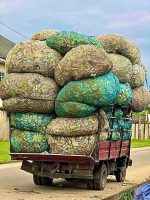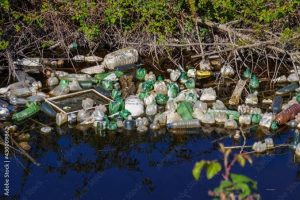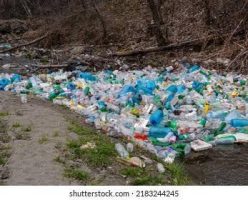Waste management has remained a significant challenge in Nigeria, likely due to the country’s high population density. The government is also not intentional about converting ‘waste to wealth’, considering the rising effects of climate change.
In Rivers State and many other states across the country, the oceans, rivers and even streams are littered with plastics and polymers, which unarguably constitute environmental and health hazards.
According to the World Bank, plastics comprise about 5 to 12 per cent of the world’s total waste generation, and a significant portion ends up in the environment as pollution.

Agreeably, plastic waste has severe consequences for both humans and the environment. It pollutes the ecosystem, harms wildlife, contaminates food and water sources and contributes to climate change.
Additionally, plastic waste can lead to various health problems in human lives.
However, undoubtedly, converting waste into domestically and commercially exportable products can boost the country’s foreign reserves and Gross Domestic Product (GDP) when exported.
The story of Mrs. Vivian Wabiye, a 30-year-old mother of three who lost her husband two years ago, is a great inspiration for relevant authorities to put priority attention on recycling waste.
Wabiye became stranded and unable to ‘eke a living’ and send her children to school after her husband, who was the family’s breadwinner, died.
After being introduced to ‘picking plastic waste’ by a friend, she started the business in earnest.

Wabiye, who was desperate to feed her children and send them to school, started picking plastic bottles from the streets and nearby rivers to sell at recycling plants and sub-locations.
Findings showed that the Kalabari-born lady from Akuku-Toru Local Government Area of Rivers State is now making brisk business from the picking of plastics. She made ₦3,000 daily at the beginning but currently rakes in between ₦5,000 and ₦10,000 from sales of plastic bottles.
Excitedly, she disclosed that she can now feed her children and also send them to school through the sale of plastic cans.
Undoubtedly, the plastic picking business is gradually becoming a significant part of society.
Similarly, Barile Numbari, 40, is sponsoring his two children in school through the sale of plastics and has paid for a shop space for his wife.
Many stories abound of people who are now taking advantage of the rising plastic waste to eke out a living.

Creating wealth from waste is also helping to take some youths off the streets and should be encouraged as a strategy to tackle unemployment. However, candidly, the awareness campaigns on this are still very low.
The Global audit and tax advisory firm, KPMG detailed NBS forecast in its International Global Economic Outlook report – H1 2023 by stating that “unemployment is expected to continue to be a major challenge due to the limited investment by the private sector, low industrialisation, and slower than required economic growth and consequently the inability of the economy to absorb the 4-5 million new entrants into the Nigerian job market every year.”
The report also revealed that there are expectations for GDP to continue growing at a relatively slow pace of three per cent in 2023, owing to the slowdown in economic activity that typically characterises periods of political transition in Nigeria.
As the rising threats posed by climate change to humanity persist, using recycled materials to create new products is one way to help reduce greenhouse gas emissions and address the climate crisis, which the planet is said to be facing.
The move towards changing the narrative is a process of converting ‘waste to wealth’ through a plastic recycling plant, thereby creating employment for the teeming population. This is one venture the government has neglected, consequently depriving the citizens of the value and complicating environmental pollution.
According to the United Nations Industrial Development Organization (UNIDO), report, Nigeria generates over 32 million tonnes of solid waste annually with plastic accounting for 2.5 million tonnes but, only 20 to 30 percent are collected and recycled. Nigeria is reportedly among the top 20 nations that contribute 83 per cent of the total volume of land-based plastic waste that ends up in the oceans.
Environmentalist/ Medical Expert Speak
An Environmentalist and Country Director of Natural Justice. Mike Karikpo told The Guardian that recycling plastic waste was in line with the ongoing global movement and necessary to tackle the rising global warming and climate crisis. He urged companies, organisations, and individuals to get involved in the movement.
Additionally, Dr. Dasetima Altraide, a Dermatologist at the University of Port Harcourt Teaching Hospital (UPTH), said recycling of waste will improve the health standard of the people as mosquitoes will be reduced, sicknesses like diarrhoea and cholera will go and it will keep the environment clean.
Meeting SDG Goals
Goal 1 of the SDGs focuses on the eradication of extreme poverty and hunger, as well as protection. The NBS, in its 2022 National Multidimensional Poverty Index Report, showed that 133 million Nigerians are multidimensionally poor.
Many Nigerians still struggle with poverty due to low industrialisation and inadequate job creation.
The nation’s unemployment rate is expected to rise to 40.6 per cent this year as compared to 2022’s 37.7 per cent, which is also above the 33.30 per cent in the fourth quarter of 2020 and 27.10 per cent in the second quarter of 2020, according to the Nigerian Bureau of Statistics, (NBS) There is no deliberate and intentional move by government to increase awareness and investments, especially in the recycling waste business to help reduce the rising issues of global warming and climate crisis.
This report, therefore, serves as a wake-up call for the government and relevant authorities in Nigeria to intensify campaigns on the climate crisis and initiate intentional approaches to mitigating the challenge.



![[FILES] A picture shows the Argentinian flag. (Photo by DANIEL LEAL-OLIVAS / AFP)](https://cdn.guardian.ng/wp-content/uploads/2020/11/Argentina-.jpg)


